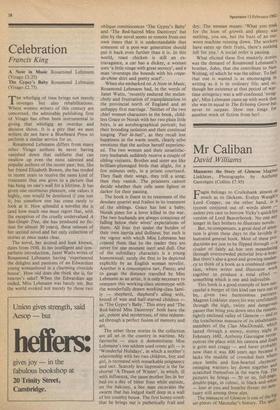Celebration
Francis King
The Gypsy's Baby Rosamond Lehmann (Virago £2.75) The Gypsy's Baby Rosamond Lehmann (Virago £2.75) rr he whirligig of time brings not merely 1 revenges but also rehabilitations. Where women writers of this century are concerned, the admirable publishing firm of Virago has often been instrumental in giving that whirligig an overdue and decisive shove. It is a pity that we men writers do not have a Bluebeard Press to perform a similar service for us.
Rosamond Lehmann differs from many other Virago authors in never having vanished down that oubliette that can swallow up even the most talented and popular authors of the recent past; but, like her friend Elizabeth Bowen, she has tended in recent years to receive the same kind of treatment that one gives to a picture that has hung on one's wall for a lifetime. It has given one enormous pleasure, one values it highly, one would be desolated if one lost it; but somehow one has come rarely to look at it. How splendid a novelist she is (and how much one must regret that, with the exception of the cruelly undervalued A Sea-Grape Tree, she has produced no fic- tion for almost 30 years), these reissues of her second novel and her only collection of stories at once make clear.
The novel, her second and least known, dates from 1930. In her intelligent and sym- pathetic introduction, Janet Watts writes of Rosamond Lehmann having 'experienced the delights and passions of an Edwardian young womanhood in a charming riverside house'. How old does she think she is, for heaven's sake? When the Edwardian age ended, Miss Lehmann was barely ten. But the world evoked not merely by those two
oblique reminiscences 'The Gypsy's Baby' and 'The Red-haired Miss Daintreys' but also by the novel seems so remote from our own times that it is understandable that someone of a post-war generation should put it back even further than it is. In this world, roast chicken is still an ex- travagance, a car has a dickey, a woman uses 'a little rouge with great secrecy', and a man 'oversteps the bounds with his crepe- de-chine shirt and pretty scarf.
When she embarked on A Note in Music, Rosamond Lehmann had, in the words of Janet Watts, 'recently endured the melan- choly and frustration of transplantation to the provincial north of England and an unhappy first marriage.' Neither of the two chief women characters in the book, child- less Grace or Norah with her two plain little boys, is an autobiographical portrait; but their brooding isolation and their continual longing 'Fuir , as they recall lost happiness in the warm south, clearly echo emotions that the author herself experienc- ed. The two women and their unsatisfac- tory husbands suddenly receive a couple of sibling visitants. Brother and sister are like brilliant-plumaged birds that alight, for a few minutes only, in a prison courtyard. They flash their wings, they trill a song; then they vanish. The prisoners cannot decide whether their cells seem lighter or darker for their passing.
The book is finest in its treatment of the desolate quartet and frailest in its treatment of the siblings. Grace has lost a baby; Norah pines for a lover killed in the war. The two husbands are always conscious of falling below their wives' expectations of them. All four fret under the burden of their own inertia and dullness; but such is the vigour with which Miss Lehmann has created them that to the reader they are never for one moment inert and dull. One of the subsidiary characters is a young homosexual: surely the first to be depicted explicitly by an English woman novelist. Another is a consumptive tart, Pansy; and to gauge the distance travelled by Miss Lehmann as an artist, it is only necessary to compare this working-class stereotype with the wonderfully drawn working-class fami- ly — shepherd, shepherd's ailing wife, brood of wan and half-starved children in 'The Gypsy's Baby.' This story and 'The Red-haired Miss Daintreys' both have the air, potent and mysterious, of time redeem- ed through a perfect fusion of memory and art.
The other three stories in the collection are all set in the country in wartime. My favourite — since it demonstrates Miss Lehmann's too seldom used comic gift — is 'Wonderful Holidays', in which a mother's relationship with her two children, boy and girl, is recreated with remarkable poignancy and tact. Scarcely less impressive is the far shorter 'A Dream of Winter', in which, ill with influenza, the same mother lies in her bed on a day of bitter frost while outside, on the balcony, a bee man excavates the swarm that has lodged itself deep in a wall of her country house. The first honey-comb that he brings out is pathetically frail and
dry. The woman muses: 'What you took for the hum of growth and plenty was nothing, you see, but the buzz of an out- worn machine running down. The workers have eaten up their fruits, there's nothing left for you.' A social order is passing.
What elicited these five masterly stories was the demand of Rosamond Lehmann's brother, John, that she contribute to New Writing, of which he was the editor. To feel that one is wanted is as encouraging In writing as it is in ordinary life; and so, though her existence at that period of war- time stringency was a self-confessed 'strug- gle', Miss Lehmann came up with work that she was to equal in The Echoing Grove but never to surpass. How one longs for another work of fiction from her!










































 Previous page
Previous page